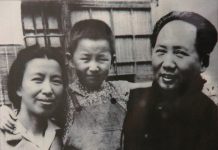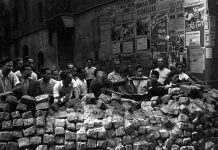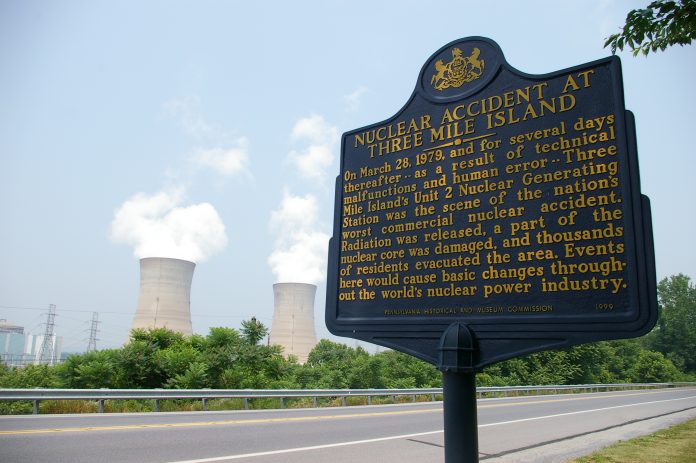
Socialistisk Biblioteks Tidslinje med links til begivenheder og personer i 1979.
Se også Index over personer, organisationer/partier og værker (som bøger, malerier, mm.), steder, begivenheder, mv., der er omtalt på hele Tidslinjen, titler og indhold på emnelisterne osv.
7. januar 1979
Pol Pot-regimet i Cambodja styrtes ved vietnamesisk invasion, og Heng Samrin bliver med vietnamesisk hjælp nyt statsoverhoved i Folkerepublikken Kampuchea. Besættelsen varer til 1989.
Se på Socialistisk Bibliotek:
Tidslinjen: 17. april 1975
28. januar 1979
Forfatteren og maleren Hans Scherfig dør (født 8. april 1905 i Kbh.)
Foto: Carl Otto Johansens skildpadde markerer Hans Scherfigs grav på Assistens Kirkegård på Nørrebro. (Kilde: Hans Scherfig / Kulturcentret Assistens)
Se på Socialistisk Bibliotek:
Personlisten: Hans Scherfig 1905-1979
1. februar 1979
Aytollah Khomeini vender tilbage fra eksil til Teheran. 11. februar sendes shahen i eksil. Præstestyret overtager magten.
Se på Socialistisk Bibliotek:
Linkboxen: Iran 1979, med materiale om den iranske revolution og kontrarevolution 1978-79.
13. marts 1979
Den progressive nationalistbevægelse NJM (under ledelse af M. Bishop) vælter Grenadas regering, og har magten indtil USAs besættelse 25. oktober 1983.
Se:
- Maurice Bishop (Red Encyclopedia)
- Grenada (Leksikon.org)
- The Grenada Revolution (site). “Learn the basics of the story of the revolution online.”
How a revolution on the tiny island of Grenada shook the world. By Brian Meeks (Jacobin, March 13, 2021). “On this day in 1979, the most remarkable social revolution in the modern history of the Anglophone Caribbean began. Today, we remember not only the crisis and imperialist invasion that brought the Grenadian Revolution to an end, but its tremendous accomplishments.”
Grenada’s Revolution at 40. By Ronan Burtenshaw (Jacobin, September 2, 2019). “Forty years ago, a socialist revolution in the tiny Caribbean island of Grenada threatened to upturn the world economic order.”
Se på Socialistisk Bibliotek:
Tidslinjen: 25. oktober 1983
26. marts 1979
Egyptisk-israelsk fredsaftale som udløber af Camp David-aftalen; første arabiske nabolands aftale med den zionistiske stat.
Se på Socialistisk Bibliotek:
Tidslinjen: 17. september 1978, om Camp David-aftalen.
28. marts 1979
Den værste kernekraftulykke med let-vandsreaktorer af vestlig type, der er sket i det 20. århundrede sker på på a-kraftsværket på Tremileøen, Three Mile Island, ved Harrisburg i Pennsylvania, USA.
Nogle uger før havde a-krafts katastrofefilmen “The China Syndrome” haft premiere i USA.
Se:
- Tremileøen (Denstoredanske)
- Three Mile Island accident (Wikipedia.org). Længere engelsk artikel.
- Atomkraft (Leksikon.org)
- Section: Nuclear Power (Union of Concerned Scientists)
25 years ago: Nuclear reactor at Three Mile Island restarted six years after partial meltdown (World Socialist Web Site; This week in history: May 24-May 30, 24 May 2010)
Three Mile Island, the NRC and Obama. By Christian Parenti (The Nation, March 27, 2009). “Thirty years after the Three Mile Island partial meltdown, the real nuclear power threat is the relicensing of old plants.”
30 years and counting: People died at Three Mile Island. By Harvey Wasserman (CounterPunch, March 24, 2009; online at Internet Archive). “As the thirtieth anniversary of America’s most infamous industrial accident approaches, we mourn the deaths that accompanied the biggest string of lies ever told in US industrial history.”
Se også på Socialistisk Bibliotek:
- Tidslinjen: 11. marts 2011, om nedbruddet på det japanske Fukhushima-atomkraftværk
- Tidslinjen: 26. april 1986, om nedsmeltning af A-kraftværket i Tjernobyl/Ukraine
- Tidslinjen: 15. april 1975, om det svenske Barsebäck-værk.
Se også om filmen Kina-syndromet:
- The China Syndrome (Wikipedia.org)
- The China Syndrome: the genre syndrome. By Doug Zwick (Jump Cut, No.22, May 1980)
- The China Syndrome: film + reality = awarenes. By Gary Weimberg (Jump Cut, No.24-25, March 1981)
23. april 1979
Ved demonstration i London med Britisk National Party blir skolelærer Blair Peach myrdet af politiet.
Links:
- Death of Blair Peach (Wikipedia.org)
Blair Peach: the case for a public inquiry. By David Renton (Blog, 23 April 2019). “Three weeks ago I spoke at a public meeting … Blair Peach joins the 1500 other people who have died in police custody since 1990 … the events of Blair Peach’s death are still crying out for justice.”
Southall ’79, when the police killed Blair Peach (Socialist Worker, Issue 2651, 19 April 2019). “Tomáš Tengely-Evans looks back at the crucial battle against racism.”
Official: cops murdered anti-racist Blair Peach (Socialist Worker, Issue 2199, 1 May 2010). “Anti-Nazi protester Blair Peach was ‘almost certainly’ killed by police during a demonstration against the National Front in Southall, west London, in 1979.”
Southall and the death of Blair Peach. By Dave Renton (Dkrenton.org.uk, 2004; online at Internet Archive). “Twenty-five years ago, in April 1979, the events of the general election were overshadowed by fighting between the police and the largely-Asian population of Southall near Heathrow in West London.”
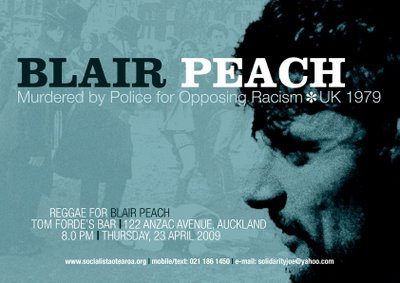
Blair – our brother, our friend. By Paul Foot (Socialist Worker, 16 June 1979, online at Marxists Internet Archive). Reprinted in Nick Grant and Brian Richardson, Blair Peach: Socialist and Anti-Racist (London, 2014).
1. maj 1979
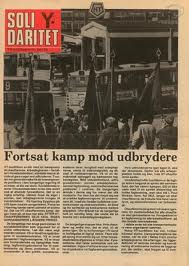
Første nummer af VS’s salgsblad (1979-1991), ugeavisen med det traditionsrige navn Solidaritet (i 1976-77 udgives tre prøvenumre). Bladet startede som VS’s uddelingsavis (1969-1985). I 1995 beslutter VS at udgive Solidaritet som et mere teoretisk tidsskrift (fra nr.2, maj 1999 med undertitlen: venstresocialistisk tidskrift for analyse og debat). I april 2014 lukkes Solidaritet (18. årgang, nr. 1, januar 1996 – 36. årgang, nr. 1, februar 2014). Nyt tidsskrift opstarter i 2015 med titlen: Solidaritet: uafhængigt socialistisk magasin (nr. 1, marts 2015 – nr. 14, april 2019). 16. marts 2019 lanceres det nye netmedie Solidaritet.
Se:
- Solidaritet (16. marts 2019- ): “Solidaritet bringer nyheder, debat og analyser fra Danmark og verden. Vi følger udviklingen og debatten på venstrefløjen både her i landet og internationalt. Vi driver forlag, laver podcast og producerer netmedie …”
- Solidaritet.dk. Tidsskrift-forlags site. Se Tidsskriftarkiv 1996-2004 + 2008-2011 (online på Internet Archive) + sitet september 2018 (online på Internet Archive)
- Bladet Solidaritet. Af Michael Schølardt (Leksikon.org)
- Solidaritet (blad) (Wikipedia.dk)
“Ikke for halvborgerlige Kujoner”. Solidaritet fylder rundt. Af Jeppe Rohde (Solidaritet.dk, 16. december 2021). “16. december 2021 er det nøjagtigt 110 år siden, den allerførste udgave af ugeavisen Solidaritet kom på gaden. Avisen blev dengang udgivet af venstreradikale kræfter på Nørrebro i København, men gav genlyd langt udenfor stenbroen.”
Plakathistorie: Øje for helheden. Af Dorte Ellesøe Hansen (SFAH, 3. marts 2019). “Plakaten [med Rosa Luxemburg] var fra 1990, og af annoncer fremgik det, at den kunne bestilles hos Solidaritet for 20 kr.”
Se på Socialistisk Bibliotek:
Arbejderhistorisk bladliste, 1911: Solidaritet: Organ for den frisindede Fagbevægelse. Ugeblad.
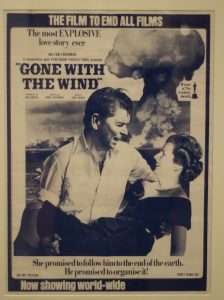
3. maj 1979
Konservativt flertal i Storbritannien og Margaret Thatcher bliver regeringsleder.
Se på Socialistisk Bibliotek:
- Tidslinjen 2. november 1990, om Margaret Thatchers regeringsperiode og økonomiske politik.
- Linksamlingen Bye Bye Maggie: Margaret Thatcher (1925-2013), med nekrologer mv.
19. juli 1979
Sandinisterne (FSLN) afslutter 45 års Somoza-diktatur i Nicaragua.
Se:
- Nicaragua (Leksikon.org)
- FSLN (Frente Sandinista de Liberación Nacional) (Leksikon.org)
- Nicaragua: En politisk og økonomisk oversigt (pdf). Af Jens Lohmann (Udenrigsministeriet/Danida, 1995, 148 s.; online på Internet Archive)
Politiske modstandere bliver fængslet og mishandlet af Ortega-diktaturet. Af Åge Skovrind (Socialistisk Information, 25. august 2022). “I juli forsøgte en international delegation fra den latinamerikanske venstrefløj at få adgang til og tjekke helbredstilstanden hos de politiske fanger i Nicaragua. Ikke overraskende blev deltagerne stoppet, da de forsøgte at komme over grænsen fra Costa Rica.”
Nicaragua: Nej til både den amerikansk kontrollerede højrefløj og Ortegas autoritære nepotisme. Af Anahí Macaroff og Charlotte Valløe (Solidaritet.dk, 12. januar 2022). “Valg uden valgmuligheder. Daniel Ortega har igen vundet præsidentvalget i Nicaragua, men havde forinden fængslet de fleste af sine modstandere. Hvordan gør venstrefløjen op med autoritære regimer som hans uden at gå højrefløjens ærinde?”
Valgresultatet i Nicaragua får mange til at rynke brynene. Af Valentina Chavez (Solidaritet.dk, 15. november 2021). “Nicaragua afviklede præsidentvalg søndag 7. november. Resultatet var givet på forhånd, for oppositionens kandidater blev fængslet i månederne op til valget. Derfor er valget af mange – både i Nicaragua og internationalt – blevet betegnet som en farce, og oppositionen i Nicaragua boykottede valget.”
Valget i Nicaragua – mellem repression og valgfarce (Autonom Infoservice, 6. november 2021). “Mange kommentatorer i latinamerikanske medier spørger, hvordan det kan være, at Ortega-regeringen fængsler oppositionelle før valget, skønt valgproceduren er rettet ind på præsidentens genvalg, idet bl.a. det centrale valgudvalg består af regeringstro bureaukrater.”
Ortega-styret i Nicaragua minder om et diktatur. Af Manuel Lopez (Solidaritet.dk, 16. oktober 2021). “Daniel Ortegas regime minder om et diktatur inspireret af mafiametoder. Alligevel fortsætter dele af den danske venstrefløj med at gøre de folkelige protester til del af en amerikansk konspiration.”
Nicaragua: Ortega-regeringen kriminaliserer oppositionen fem måneder før valget (Autonom Infoservice, 25. juni 2021). “Nicaraguas regering under ledelse af præsident Daniel Ortega er ved at skabe sig optimale betingelser for et genvalg den 7. november. Dette iværksættes ved at fængsle oppositionens talspersoner og aktivister …” Se også: Nicaragua: Enhedslisten fordømmer undertrykkelsen af oppositionen, og kræver frigivelse af de politiske fanger (Solidaritet.dk, 23. juni 2021).
Tidsdoku. Væbnet opstand i Nicaragua 1979 – interview med en sandinista (Autonom Infoservice, 21. august 2019). “Vi bringer her interviewet, der er offentliggjort i Venstresocialisternes avis ’Solidaritet’ nr. 7, 1980.”
Nicaragua: 40 år med den sandinistiske revolution (Solidaritet.dk, 19. juli 2019Fredag d. 19. juli markerer 40-årsdagen for den sandinistiske revolution i Nicaragua. Vibeke Syppli gør status over landets udvikling i perioden.”
Ægte demokrati i Nicaragua kræver forandring (Solidaritet.dk, 19. juli 2019I anledning af 40-året for den sandinistiske revolution i Nicaragua, kræver Enhedslistens Nicaragua-gruppe et opgør med den udemokratiske udvikling, som landet under Daniel Ortegas ledelse er gennemgået de seneste år.”
Daggry og mørke i Nicaragua. Af Valentina Chavez og Leif Mikkelsen (Socialistisk Information, 13. juli 2019). “I denne uge er det 40 år siden sandinisterne væltede Somoza og indledte revolutionen i Nicaragua. Revolutionen blev en inspiration for en hel generation af socialister.” Også online på Solidaritet.dk.
Fodslæb på venstrefløjen (Solidaritet.dk, 16. maj 2019). “Vibeke Syppli Enrums Signatur handler om venstreorienterede bevægelser, der begynder at marchere i den forkerte retning. Hun retter blikket mod Nicaragua, ‘der blot er ét eksempel ud af mange’.”
Nicaragua – nok engang på USA’s dagsorden. Af Troels Hummelgren og Julie Wetterslev (Konfront.dk, 18. april 2019). “For et år siden udbrød store demonstrationer mod den sandinistiske regering i Nicaragua … Og som sædvanligt har den politiske konflikt ikke alene udspring inden for landets grænser, da der også geopolitiske interesser på spil.”
Nicaragua: Hvor er oprøret på vej hen? Af Dan La Botz (Socialistisk Information, 1. juli 2018). “Den aktuelle protestbevægelse i Nicaragua bærer tydeligt kendetegn af en folkelig opstand.” Se også Tomas Andino Mencia: Nicaragua: En kritisk venstrefløjsanalyse (ibid., 1. juli 2018)
Sandinisme eller “Danielisme”? Af Hans-Peter Renk (Socialistisk Information, 4. marts 2017). “I dag kontrolleres FSLN af Daniel Ortega (livsvarig præsidentkandidat) og hans klakører.”
Valg i Nicaragua: Ortega-klanens alliance med højrefløjen og kirken. Af Alfred Lang (Autonom Infoservice, 30. oktober 2016). “Nu kritiseres Ortega for at have kopieret Somozas korrupte adfærd. Det er en stående anklage, som fremføres af mange af Ortegas tidl. kampfæller fra sandinstbevægelsen.”
Fortidens synder, 4: Jyllands-Posten, Ronald Reagan og ‘sandinist-diktaturet’. Af Ulrik Dahlin (Information, 6. september 2008). “Når Jyllands-Posten skriver om det venstreorienterede sandiniststyre i Nicaragua, er tonen hård og direkte, hvorimod avisen mere er afdæmpet og udglattende, når det gælder Reagans Iran-Contra-skandale.”
Nicaragua 1979-2019 – Sandinist-revolutionens historia (pdf). Av Eric Toussaint och Nathan Legrand (Marxistarkiv.se, 21. september 2019). “För revolutionärer är en förståelse för utvecklingen i Nicaragua av stor vikt: Varför gick det snett? Vad kunde man ha gjort för att undvika nederlaget? Osv osv. Följande artikel är ett försök att göra ett bokslut över revolutionen i Nicaragua.” In English: Nicaragua 1979-2019 (CADTM, 18 July 2019).
In English
Nicaragua needs a new revolution (New Politics, December 23, 2024). Dawn Marie Paley interviews Mónica Baltodano: “This dictatorship is worse than it was under Somoza.”
Nicaragua: Daniel Ortega & the ghost of Louis Bonaparte. By William I. Robinson (Against the Current, Issue 221, November/December 2022). “I have been writing for some time now about this degeneration of Sandinismo and the descent of Nicaragua into dictatorship. Here I want to update and deepen the historical and political analysis.”
Ortega’s synthesis. By Jonah Walters (New Left Review/Sidecar, 12 November 2021). “Nicaragua after the election … it is vital for internationalists to clear the fog of the Cold War and look with fresh eyes on the political-economic coordinates of 21st-century sandinismo.”
After bogus Nicaraguan election, Daniel Ortega remains dictator. By Dan La Botz (New Politics, November 11, 2021). “While Ortega’s government has been authoritarian since he returned to power in 2007, it has now assumed all of the characteristics of a dictatorship.”
What the Sandinistas won in Nicaragua (Jacobin, July 19, 2021). “To mark the July 19, 1979 anniversary, Nicolas Allen spoke with historian Jeffrey L. Gould to discuss the Sandinista Revolution and to try to understand all its complexities, triumphs, shortcomings, and the lessons that can be learned from one of the ‘last social revolution of the twentieth century.”
Nicaragua: Ortega arrests opposition candidates ahead of November 2021 election. By Dan La Botz (New Politics, June 17, 2021). “We should reject the argument made by some on the left that we have to support the dictator Ortega and his government because the U.S. is now opposed to it.”
Fortieth anniversary of the Nicaraguan Revolution: twenty-ninth anniversary of the counter-revolution in power. July 19, 2019). “Today Ortega, the former revolutionary transformed into a counter-revolutionary, remains in power.”
Nicaragua 1979-2019. By Eric Touissaint and Nathan Legrand (Against the Current, Issue 201, July-August 2019). “The Left has many more reasons to denounce the policies of the regime. To understand this, we must go back to 1979. That year saw the victory of an authentic revolution in Nicaragua that combined a popular uprising, self-organization of cities and neighborhoods in rebellion…”
Sandinismo is in the streets. By Dianne Feeley (Against the Current, Issue 201, July-August 2019). “Those of us who have been supporters of the Sandinista Revolution need to see that the Ortega-Murillo regime has stained that revolution. Our solidarity, therefore, has two tasks: to stay the hand of Washington, and to build networks of solidarity with the civic movement.”
The Nicaraguan crisis and the Manicheanism of the US Left. By William I. Robinson (Verso, Blog, 19 August 2018). “Washington’s primary interest in Nicaragua is not getting rid of Ortega but in preserving the interests of transnational capital in the country and the hegemony of capital over any post-Ortega political project.”
An authentic revolution in 1979. By Éric Toussaint (International Viewpoint, Issue 523, August 2018). “On 9 July 1979, an authentic popular revolution triumphed over the dictatorial dynasty of the Somoza regime” + part 2: The evolution of the regime of President Daniel Ortega since 2007. By Éric Toussaint (ibid.).
Unexpected uprising: The crisis of democracy in Nicaragua. By Courtney Desiree Morris (NACLA, May 14, 2018). “How did recent protests over social security cuts in Nicaragua turn into a nationwide grassroots mobilization against President Daniel Ortega?” På dansk: Ortega sat på prøve (Kritisk Debat, 15. juni 2018; online på Internet Archive).
Nicaragua’s popular rebellion stopped — for now. By Dan La Botz (New Politics, Blog, August 1, 2018). “What is the state of the popular rebellion in Nicaragua? What brought about the rebellion? Who is involved in the rebellion? Who are the most important national and international actors? And what is the nature of the Left’s debate over Nicaragua?”
Nicaragua: A view from the Left. By Jeffrey L. Gould (NACLA, July 25, 2018). “Making sense of Daniel Ortega’s slow betrayal of the Nicaraguan revolution.”
Nicaragua in pain. By Claudio Katz (International Viewpoint, Issue 522, July 2018). “Memories of the Sandinista Revolution are still alive for the generation that lived through it. To remain silent would be an affront to those who took part in that memorable insurrection against Somoza.”
Nicaragua: the epilogue. By Mike Gonzalez (RS21: Revolutionary Socialism in the 21st Century, 13 May 2018). “The violent suppression of anti-austerity protests in Nicaragua marks another nadir in the long decline of Sandinismo.”
Are we on the eve of another Nicaraguan Revolution?: Nicaraguan government kills 24 – students, farmers call for national strikes. By Dan La Botz (New Politics, Blog, April 24, 2018). “How did a political party and a government born in a popular revolution in 1979 go so wrong?” See also Dan La Botz: Nicaragua: Where is the rebellion going? (ibid., June 6, 2018).
Daniel Ortega, Nicaragua’s Nov. 6 Election, and the betrayal of a revolution (New Politics, Blog, October 17, 2016). “Dan La Botz, author of the new book What Went Wrong? The Nicaraguan Revolution: A Marxist Analysis (Brill, 2016/Haymarket Books, 2018, 400 p.), asks here how the Nicaraguan revolution was betrayed and what ideas and decisions of the Sandinistas themselves were responsible for the betrayal.” See review of Dan La Botz’ book by Mike Gonzalez: The wheel has come full circle (Against the Current, Issue 190, September-October 2017) + by Todd Chretien: How the Nicaraguan Revolution was lost (International Socialist Review, Issue 110, Fall 2018)
Nicaragua’s authoritarian turn is not a product of leftist politics. By Jennifer Goett and Courtney Desiree Morris (NACLA: Reporting on the Americas, 16 September 2016). “Political repression in the country has its roots in U.S. intervention.”
Nicaragua’s compromised revolution. By Jonah Walters (SocialistWorker.org, July 25, 2016). “Nicaraguan President Daniel Ortega once led a vibrant radical movement, but he and the Sandinistas are compromised today.”
Ortega’s betrayal. By Jonah Walters (Jacobin: Reason in Revolt, April 12, 2016). “Today’s Sandinista leaders are a far cry from the revolutionaries that once inspired the international left.”
Nicaragua: Lessons of a country that did not finish its revolution, Part One. By Claudio Villas (In Defence of Marxism, 17 January 2008) + Part 2 (18 January 2008). Se også kritik fra Louis Proyect: A sectarian version of the lessons of Nicaragua (January 18, 2008)
Nicaragua: the return of the Sandinistas (Socialism Today, Issue 106, December 2006 – January 2007). “Kevin Thompson assesses whether the result represents another shift to the left in Latin America.”
Nicaragua: From Sandinismo to ‘Danielismo’. By Mónica Baltodano (International Socialist Review, Issue 50, November–December 2006). “The article details the degeneration, under Daniel Ortega’s leadership, of the FSLN since right-wing candidate Violeta Chamorro ousted it in the 1990 election.”
Nicaraguan election: Ortega’s victory and the dead-end of Sandinismo. By Rafael Azul and Patrick Martin (World Socialist Web Site, 30 November 2006). “The FSLN has moved steadily to the right during the 16 years since it gave up the presidency.”
Ortega wins Nicaraguan elections. By Paul Hampton (Solidarity, 3/102, 16 November 2006). “Daniel Ortega, the Sandinista National Liberation Front (FSLN) leader was re-elected president last week. But for all the flag waving, it’s clear that this is hardly a victory for the Nicaraguan working class.”
No more heroes: Nicaragua 1996. By Mike Gonzalez (International Socialism, Issue 74, March 1997). “Daniel Ortega lost a presidential election for the second time in October 1996 … The gulf between the high rhetoric of the revolutionary leaders and the reality those fine words obscured has become a yawning abyss.”
Den sandinistiska revolutionen (pdf). Av Henri Weber (Bokförlaget Röda Rummet, 1983, 112 sider; online på Marxistarkiv.se). Innehåll: Bakgrunden – Den revolutionära krisen – Kampen om makten – Övergången till socialismen – Sandinisternas ekonomiska politik – Den nya regimen: Sandinismen och demokratin – Framtidsutsikter.
The Nicaraguan Revolution: classes, masses and the Sandinista state. By Mike Gonzalez (International Socialism, No.17, Autumn 1982, p.39–90). “The hegemony of the FSLN in this new Nicaragua was undisputed. The revolution in a narrow sense – the armed overthrow of the state and the abolition of its armed force by popular insurrection – had taken place. The revolution in a broad sense, however – the assumption of power over the whole of society by the working class – faced a series of limitations which derived from the peculiar character of Nicaragua’s historical development.” Dansk udgave: Revolution i Nicaragua: massebevægelsen, klassekampen og den sandinistiske stat (VS-fraktionen Faglig Fællesliste, 1983, 28 s.)
Se også:
Remembering Sandino. By Jonah Walters (Jacobin: Reason in Revolt, 7 March 2017). “The Nicaraguan nationalist was assassinated eighty-three years ago last month.”
29. juli 1979
Filosoffen Herbert Marcuse dør i Starnberg, Vesttyskland (født 19. juli 1898 i Berlin).
Se:
- Marcuse, Herbert (Leksikon.org)
- Herbert Marcuse (Wikipedia.org)
- Herbert Marcuse (1898-1979) (Official Homepage: What’s New, Biography, Books, Frequently Asked Questions).
- Herbert Marcuse Archive, 1898-1979 (Marxists Internet Archive). Biography, works & further readings.
Samfundsperiferien: Den potentielle revolutionære kraft. Af Frederik Boris Hylstrup Olsen (Solidaritet.dk, 19. januar 2021). “Revolutionens subjekter forvises til samfundets udkant, eller forsøges integreret i arbejdsmarkedet i en sådan grad, så de ikke længere er i stand til at gøre egentlig modstand, forklarer den tysk-amerikanske filosof, Herbert Marcuse.”
Redeeming Marcuse. By Ian Parker (Anticapitalist Resistance, 19 June 2022). Review of the new edition of Herbert Marcuse’s Psychoanalysis, Politics, and Utopia: Five Lectures (Repeater Books, 2022, 152 p.). “These five essays are gathered from different times, from the mid-1950s to the late 1960s, which was when Marcuse was able to more immediately connect again with revolutionary movements as an inspirational figure in the ‘New Left’ …”
What Herbert Marcuse got right — and wrong. By Jeremy Cohan and Benjamin Serby (Jacobin, December 27, 2021; from Catalyst, Vol.5, No.2 Summer 2021). “Socialists today should learn from Herbert Marcuse’s One-Dimensional Man: in particular, its spirit of protest, its materialist social theory, and its warnings about commodified liberation. But they should leave behind its moralism and despair about change.”
In defense of Herbert Marcuse. By Mike Watson (Jacobin, February 27, 2021). “For journalist Matt Taibbi, Herbert Marcuse is a pseudo-intellectual at fault for much of what ails the contemporary left. But the real Marcuse was a serious thinker who remained committed to socialism and working-class struggle. In our moment of political defeat, his works like One-Dimensional Man are well worth revisiting. See also Matt Taibbi: Marcuse-Anon: cult of the pseudo-intellectual (TK News, February 16, 2021).
One Dimensional Man at 50. By Stephen Eric Bronner (Logos: A Journal of Modern Society and Culture, Vol.14, No.1, Winter 2015). “For all practical purposes, ODM introduced critical theory to the United States.”
Refusing Whitfield and rethinking Marcuse: 50 years after One Dimensional Man and other things. By Arnold Farr (Logos: A Journal of Modern Society and Culture, Vol.14, No.1, Winter 2015). “Whitfield’s article should be refused not because it is anti-Marcuse, but instead, because almost every paragraph gets it wrong.”
Democracy, social change, and one-dimensionality: reviving Marcuse. By Arnold L. Farr (Logos: A Journal of Modern Society and Culture, Vol.5, No.3, Fall 2006; online at Internet Archive). “In this essay I want to examine the relevance of Marcuse’s voice in the 21th century by examining the issues raised in the three recently published volumes of Marcuse’s unpublished works.”
Remembering Herbert Marcuse. By Doug Ireland (ZNet, July 20, 2005). “Marcuse was a major influence on my own thinking, and so much of what he wrote is enormously pertinent to the world in which we find ourselves today.”
Goodbye Comrade M. By David Widgery (Socialist Review, No.14, September 1979). “Marcuse is known by some marxists solely as a man who thought the working class were finished as an agent of social change and most liberals as the brains behind the student revolt. He was neither.”
Herbert Marcuse, 1898–1979. By Martin Thomas (Workers Action, 1979). “Marcuse did not give answers. But his ideas gained some currency because he spoke more directly than others to the feelings and frustrations of the radical students.”
Critique of Marcuse: One dimensional man in class society. By Paul Mattick (Merlin Press, 1972, 110 p.). “Not only is the working class written off here as an agent of historical change but so is its bourgeois opponent.” På dansk: ‘Kritik af Marcuse: Det en-dimensionale menneske i klassessamfundet’. I Paul Mattick: Kapitalistisk og proletarisk arbejderbevægelse (Bibliotek Rhodos, 1975, s.164-241).
Herbert Marcuse and Marxism. By Robert Langston (International Socialist Review, Vol.29, No.6, November-December 1968). “His proposition that the working class has become such a conservative element – not just temporarily and under specific conjunc-tural conditions but permanently and as a consequence of structural changes in capitalist society – is not the result of any new theoretical discovery.”
Natural science and human theory: A critique of Herbert Marcuse. By Peter Sedgwick (Socialist Register, 1966, p.163-192). “For Marcuse’s portrait of contemporary science, despite his pointed collation of scraps from different investigators and theorists, is misleading in gross and in detail.”
Se også:
Resistance versus emancipation: Foucault, Marcuse, Marx, and the present moment. By Kevin Anderson (Logos: A Journal of Modern Society and Culture, Vol.12, No.1, 2013). “In the discussion that follows, however, I would like to concentrate on a philosophical orientation that influences contemporary radical movements, centered on the all-too-common preoccupation with notions of ‘resistance’.”
1. september 1979
Den første arbejdsløshedsmarch i Danmark efter 2. Verdenskrig starter i Ålborg og ender i København i Fælledsparken 15. september. Parolen “For en aktiv og slagkraftig arbejdsløshedsbevægelse”. Iført deres farverige veste deltager de i en række aktioner, arbejdskampe, blokader mv. undervejs.
Marcherne varede 1979-1982.
Se:
Arbejdsløshedsmarchen [sang] 1982. Af Kurt-Emil Ravn. (BT, 21. nov. 2010)
10. september 1979
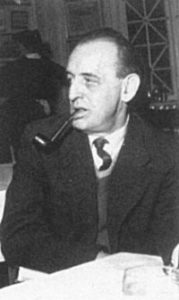
DKP’er, SF’er og VS’er Kai Moltke dør ( Født 28. november 1902)
Se:
- Kai Moltke (Leksikon.org).
- Kai Moltke (Wikipedia.dk). Med systematiske oversigter mv.
- Kai Moltke (Dansk Biografisk Leksikon/Denstoredanske.dk)
Litteratur:
Kai Moltke: en bibliografi 1920-1958. 2 bind. Af Jørgen Nøddegaard (1983, 156 sider). Hovedopgave ved Danmarks Biblioteksskole, København.
Af en socialistisk veterans erindringer: Kai Moltke fortæller (Ørenlyd, 1977, 112 sider)
Eurokommunismen: historiske forudsætninger, den aktuelle situation og fremtidsperspektivet. Af Kai Moltke (Suenson, 1977, 127 sider)
Mordet på Komintern: erindringer fra Moskva i perioden 1932-36. Af Kai Moltke (Fremad, 1976, 208 sider)
Fire år i fangedragt: af en socialistisk folketingsmands erindringer. Af Kai Moltke (Gyldendal, 1973, 155 sider)
Stalins gengangere: erindring og dokumentation. Af Kai Moltke (Gyldendal, 1970, 234 sider). (Se anmeldelse af Hans-Ludwig Evermann (Årbog for arbejderbevægelsens historie, nr.1, 1971, side 127-131).
Pengemagt og Ruslandspolitik. 2 bind. Af Kai Moltke (Forlaget Tiden, 1953) om “Påskekrisen”/Kongens kupforsøg i 1920.
Mr. Churchills anden front. Af Kai Moltke (Frit Forlag, 1947)
3. oktober 1979
Den græskfødte marxistiske sociolog Nicos Poulantzas dør i Paris (fødes 21. september 1936 i Athen). I 1970’erne var Poulantzas, sammen med Louis Althusser, en ledende repræsentant for strukturalistisk marxisme og blev senere eurokommunist og var også inspirator for Ernesto Laclau & Chantal Mouffes “postmarxisme”. Han er mest kendt for sine teoretiske arbejder om staten, men har også bidraget til marxistiske analyser af fascisme, klasser, og de sydeuropæiske diktaturer i 1970’erne.
Se:
- Nicos Poulantzas (Wikipedia.dk) + Nicos Poulantzas (Wikipedia.org)
- Nicos Poulantzas (Marxists Internet Archive; Svenska arkivet)
- Texter av och om Nicos Poulantzas (Marxistarkiv.se)
Föregångaren: Nicos Poulantzas (pdf). Av Ellen Meiksins Wood (Marxistarkiv.se, 31. marts 2016, 14 sider). Kapitel 3 ur Ellen Meiksins Wood, The Retreat from Class (Verso, 1986). “I denna text tar Meiksins Woods itu med den grekiske ”althusserianen” Nicos Poulantzas, som banade väg för ‘postmarxismen’ …”
In English:
The work of Nicos Poulantzas is vital for understanding the authoritarian Right. By Panagiotis Sotiris (Jacobin, January 5, 2023). “Nicos Poulantzas developed a highly original interpretation of fascism, seeing it as a potential that lurked within all capitalist states under conditions of crisis. His work can help us understand the danger posed by right-wing authoritarianism today.”
Nicos Poulantzas: State, class and the transition to socialism. By Doug Enaa Greene (Links: International Journal of Socialist Renewal, August 5, 2015). “… it is worth looking at Poulantzas’ work in three areas: the state, class and the transition to socialism.”
The state, power and the democratic road to socialism – the ideas of Nicos Poulantzas. By Mark Winter (RS21: Revolutionary Socialism in the 21st Century, June 27, 2015). “Nicos Poulantzas is frequently cited as one of the strongest influences on the new Syriza government in Greece.”
The Nicos Poulantzas I knew (Versobooks.com, Blog, 5 March 2015). Interview with Michael Löwy, who was for seven years Nicos Poulantzas assistant at the Université de Paris 8-Vincennes.
Poulantzas and Eurocommunism. By Simon Hardy (Marxisttheory.org). “Poluantzas was used by neo-reformist political currents in Europe to justify their positions, he himself had a much more nuanced position.” Chapter 31 in Simon Hardy: Destruction of Meaning (2013; chapters in right column on the page)
Nicos Poulantzas and the capitalist state (International Socialist Group, August 16, 2012; online at Internet Archive) + Part 2: Poulantzas and Gramsci: state and strategy (September 26, 2012). “Chris Walsh argues that his theory of the capitalist state is essential for any serious attempt to understand this problematic issue in the Marxist tradition.”
Poulantzas and socialist strategy. By Richard Seymour (Lenin’s Tomb, October 13, 2011) + Terrifyingly real: Poulantzas and the capitalist state (January 25, 2012) + Notes on Poulantzas and social classes (August 16, 2012). “This series of posts deals with some aspects of Poulantzas’ thinking on political strategy.”
Marxism without class struggle? By Ellen Meiksins Wood (Socialist Register, 1983, p.239-271). “The case of Nicos Poulantzas best exemplifies the new union of Marxist theory with Eurocommunist practice.”
‘A ‘New’ Reformism?: A critique of the political theory of Nicos Poulantzas. By Colin Barker (International Socialism, Issue 4, Spring 1979, p.88-108). “Poulantzas is not putting forward a ‘new’ strategy, but an old, tried and tested, fully guaranteed formula – for working-class defeat.”
Marxism, sociology and Poulantzas’s theory of the state. By Simon Clarke (Capital and Class, Issue 2, 1977, p.1-31). “… despite the Marxist rhetoric, Poulantzas is unable to get beyond a structural-functionalist theory.”
The Debate between Nicos Poulantzas and Ralph Miliband in “New Left Review” (1969-1976):
- Miliband–Poulantzas debate (Wikipedia.org)
- The problem of the capitalist state (pdf). By Nicol [i.e. Nicos] Poulantzas (New Left Review, Issue 58, November-December 1969, p.67-83; online at Internet Archive)
- The capitalist state: reply to Nicos Poulantzas (pdf). By Ralph Miliband (New Left Review, Issue 59, January-February 1970, p.53-60)
- Poulantzas and the capitalist state (pdf). By Ralph Miliband (New Left Review, Issue 82, November-December 1973, p.83-92)
- The capitalist state: a reply to Miliband and Laclau (pdf). By Nicos Poulantzas (New Left Review, Issue 95, January-February 1976, p.63-83)
See also on the debate:
Dialogue of the deaf: Some reflections on the Poulantzas-Miliband Debate. By Bob Jessop (Bobjessop.org, January 14, 2014; online at Internet Archive). Chapter in P. Wetherly, C.W. Barrow, and P. Burnham, eds., Class, Power and the State in Capitalist Society: Essays on Ralph Miliband (Palgrave, 2007, p.132-157)
The state and capitalism today. By Chris Harman (International Socialism, Issue 51, Summer 1991, p.3-57). Se section: “The state as simply a superstructure”.
Litteratur:
- The Poulantzas Reader: Marxism, Law and the State (pdf). Edited by James Martin (Verso, 2008, 437 p.; online at Ouleft.org)
- Nicos Poulantzas: Politisk magt og sociale klasser. 2 bind (Aurora, 1981-82, 342 sider)
- Nicos Poulantzas: Staten, magen og socialismen. Red. Johannes Andersen (Bibliotek Rhodos, 1981, 128 sider)
- Nicos Poulantzas: Om klasser (Grus Arbejdstekster, 1981, 10 sider)
- Nicos Poulantzas: Staten, magten, socialismen: på vej mod en demokratisk socialisme (Socialistisk Politik, nr.10, november 1978, s.14-23). Plus kommentarer fra Gert Petersen (s.24-25) + Vibeke Sperling (s.26-27)
- Nicos Poulantzas: Diktatorernes krise: Portugal, Grækenland, Spanien (Aurora, 1975, 123 sider)
Se også på Socialistisk Bibliotek:
- Tidslinjen 16. oktober 1918 om Louis Althusser.
- Tidslinjen 13. april 2014 om “postmarxisten” Ernesto Laclau.
7. oktober 1979
De tyske Grønne for første gang i et parlament. (Landdagen i Bremen).
Se:
Bündniss 90/Die Grünen (Leksikon.org).
November 1979
Første landsmøde i Fælles Kurs Klubberne.(Partiet Fælles Kurs stiftes 19. april 1986, se denne)
2. november 1979
Kvinde- og rødstrømpeorganisationer besætter Grevinde Danner Stiftelsen i Nansensgade, og forvandler det til Krisecentret.
Se:
- Grevinde Danner (Leksikon.org)
- Grevinde Danner (Wikipedia.dk)
- Louise Danner (Denstoredanske)
Danner (Danner.dk). “Siden 1980 har Danner drevet et krisecenter i København. På Danners krisecenter er der plads til 18 voldsudsatte kvinder og deres børn.”
Ny gadekunst i København: Kvindebevægelse hyldes med statue af Grevinde Danner. Af Ole Wugge Christiansen (Solidaritet.dk, 25. november 2024). “Skråt over for Grevinde Danner Stiftelsen er en statue skabt af den feministiske kunster Kirsten Justesen blevet afsløret. Den forestiller Louise Rasmussen aka grevinde Danner, men hylder samtidig hele kvindebevægelsen i Danmark.”
Frederik 7., grevinde Danner og Carl Berling. Af Claus Møller Jørgensen (Danmarkshistorien.dk, 14. oktober 2024). “Det livslange venskab mellem Frederik 7. (født 1808, regent 1848-1863), grevinde Danner (1815-1874) og Carl Berling (1812-1871) var af afgørende betydning for dem som personer. Men det havde i nogle tilfælde også politisk betydning, fordi kongen havde politisk indflydelse, og grevinden og Berling havde indflydelse på ham.”
4. november 1979
61 personer bliver taget som gidsler ved studenternes besættelse af USAs ambassade (spion-rede) i Teheran.
Se:
US Embassy In Iran Stormed by civilians (Youtube.com)
Se på Socialistisk Bibliotek:
Linkboxen: Iran 1979, om den iranske revolution og kontrarevolution 1978-79.
7. november 1979
Folkebevægelsen mod Hårde Stoffer stiftes og starter blokaden mod hårde stoffer på Christiania.
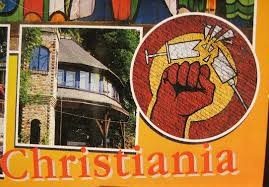
Se:
Christiania – en oversigt (til og med 1991). NB årene 1978 ff.
5. december 1979

Hans Jørgen Nielsens generationsroman Fodboldenglen : En beretning udkommer (forlag: Tiderne Skifter). “Et epokalt værk” if. dansklærere.
Se:
Fodboldenglen – en skrøbelig mandlig skønhedsutopi (Dansk litteraturs historie (bind 5, s.270-273/Denstoredanske.dk)
Se på Socialistisk Bibliotek:
Tidslinjen: 23. juni 1941, om forfatteren Hans Jørgen Nielsen.
10. december 1979
Mors dag? Den katolske nonne og ordensstifter Moder Teresa (født 26. august 1910, Skopje i Makadonien, død 5. september 1997, Kolkata /Calcutta, Indien) får Nobels fredspris for at undlade helbredelse af sygdomme hos Calcuttas fattige, men lindring ved bøn, et særligt fænomen i den katolske overtro. Hun har udtalt at den største trussel mod freden er abort!
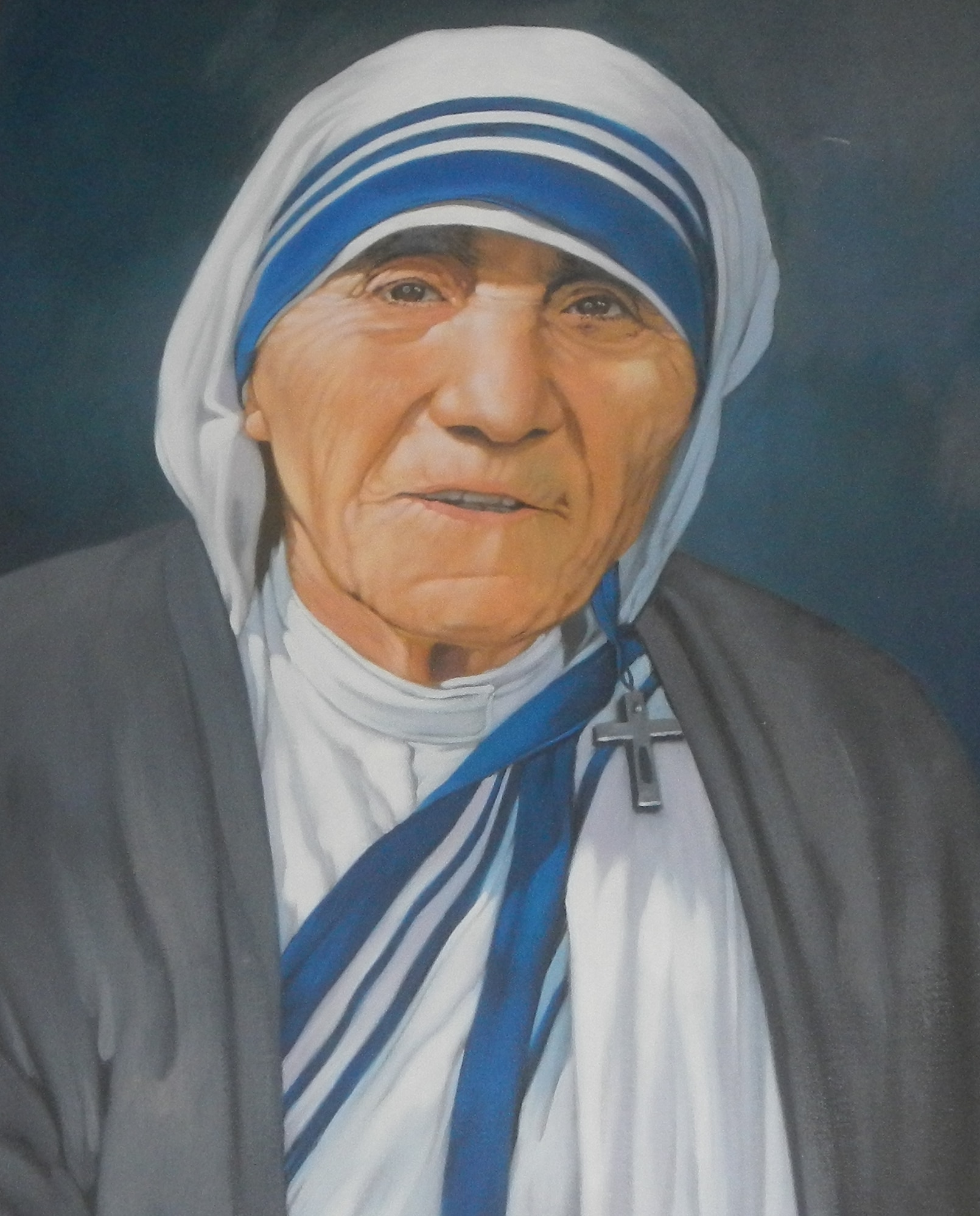
Se:
- Moder Teresa (Denstoredanske.dk). Kortere dansk intro.
- Moder Teresa (Wikipedia.no)
- Mother Teresa (Wikipedia.org)
- Criticism of Mother Teresa (Wikipedia.org)
Articles:
‘Saint’ Teresa of Calcutta: a fanatic stooge of the ruling class. By Arturo Rodríguez (In Defence of Marxism, 6 September 2016)
Mother Teresa’s sainthood, Nobel Prize deeply flawed. By Aroup Chatterjee (Hindustan Times, June 16, 2016)
It’s a Sin. By Michel Campbell (Socialist Review, Issue 281, January, 2004). Review of Aroup Chatterjee, Mother Teresa: The Final Verdict (Calcutta, Meteor Books, 2003)
Wojtyla and Teresa, or a case of saintly overproduction (In Defence of Marxism, 2 November 2003)
The Missionary Position (Wikipedia.org). About a book by Christopher Hitchens (1995)
Why Calcutta? By Amit Chaudhuri (London Review of Books, Vol.18, No.1, 4 January 1996). Review of Christopher Hitchens, The Missionary Position: Mother Teresa in Theory and Practice (Verso, 1995, 98 p.)
Mommie Dearest. By Christopher Hitchens (Slate, October 20, 2003).”The pope beatifies Mother Teresa, a fanatic, a fundamentalist, and a fraud.”
Hell’s Angel: Mother Teresa (YouTube.com, 24:33 min.). A 1994 British Channel 4 television documentary about Mother Teresa by Christopher Hitchens, a precursor to his book, The Missionary Position.
12. december 1979
NATO’s såkaldte dobbeltbeslutning om opstilling af 572 Pershing atomraketter i Europa bliver startpunktet for en ny fredsbevægelse i 80’erne, især i Danmark Nej Til Atomvåben, NTA.
Litteratur:
Fred i bevægelse: Fortegnelse over tidsskriftsartikler på Tidsskriftcentret om den politiske diskussion i og omkring vesteuropæisk fredsbevægelse 1979-84. Af Anna Rasmussen (Tidsskriftcentret, 1985, 119 sider; 776 numre + register og Tidsskriftsoversigt).
En oprørt folkelig modstand. Et studie i Nej til Atomvåbens positioneringer i den danske fredsbevægelse og transnationale netværksdannelse. Af Kevin Halfdan Gjedde (Saxo-Institutttet, 2016, 87 sider). Kandidatspeciale i historie.
Se også:
Fredsbevægelsen (Leksikon.org).
Historien om Fagbevægelsen for fred. Af (Arbejderen.dk, 19. april 2022). “I 80’erne ville NATO opstille 572 atomraketter i Europa. Truslen om en atomkrig førte til en opblomstring af fredsbevægelsen godt hjulpet på vej af fagbevægelsens støtte og engagement i kampen for fred.”
24. december 1979
Den tidligere tyske venstrefløjs- og studenterleder Rudi Dutschke dør i Århus. (Født 7. marts 1940 i Schönefeld, forstad til Berlin, fhv. DDR).
Se:
- Dutschke, Rudi (Leksikon.org)
- Rudi Dutschke. Af Per Øhrgaard (Denstoredanske)
- Rudi Dutschke (Wikipedia.dk). Længere dansk artikel.
- Rudi Dutschke (Wikipedia.org). Længere engelsk artikel.
- Rudi Dutschke (Wikipedia.de). Lang tysk artikel.
For 50 år siden: Attentatet på 68-oprøreren Rudi Dutschke (Autonom Infoservice, 10. april 2018) + Rudi Dutschke & 68-bevægelsen (17. april 2018). “11. april 1968 blev Rudi Dutschke skudt ned på åben gade af en højreekstremist. Rudi Dutschke overlevede, men døde 11 år senere i Århus, hvor han levede i eksil.”
Forkerte ord om Rudi Dutschke. Af Hosea Dutschke (Berlingske.dk, 24. marts 2010). “Bent Blüdnikow bruger en tendentiøs bog skrevet af Hans Kundani og en endnu mere tendentiøs boganmeldelse til at anklage Rudi Dutschke for at ville føre en voldelig kamp til den bitre slutning. Magen til vrøvl skal man lede længe efter.”
Rudi Dutschke’s internationalism is still a subversive creed. By Cecilia Sebastian (Jacobin, February 8, 2024). “Rudi Dutschke was West Germany’s most prominent radical in the late 1960s and a hate figure for Axel Springer’s right-wing group. Dutschke’s internationalism is more vital than ever today as the German power elite tries to criminalize international solidarity.”
Why Germany’s 1968 movement has not failed (DW, 11 April 2018). “Fifty years ago, the leader of Germany’s student movement Rudi Dutschke was wounded in an assasination attempt. His widow Gretchen tells DW why she feels positive about the social changes that emerged from the protests.”
Rudi Dutschke and the German student movement in 1968 (Socialist Worker, Issue 2099, 29 April 2008). “The events of 1968 had a major impact across the world. German activist Volkhard Mosler looks at the movement in West Germany and the politics of its leader Rudi Dutschke.”
Tekster online:
Rudi Dutschke: Forsøg på at stille Lenin på benene: Om den halvasiatiske og vesteuropæiske vej til socialismen. Lenin, Lukács og tredie internationale (Modtryk, 1975, 332 sider; online på Marxistisk Internet Arkiv; Dansk afdeling)
Rudi Dutschke: Konsten att ärva (Marxists Internet Archive; Svenska arkivet). Intervju ur den norska tidskriften “Kontrast” 1977.
Litteratur:
Et skønt, barbarisk liv: Rudi Dutschke – en biografi. Af Gretchen Dutschke (Modtryk, 1997, 541 sider). Se anmeldelse af Jakob Nerup: Rudi Dutschke – revolutionær marxist fra 1968 (Socialistisk Revy, nr. 3, april 1998)
25. december 1979
Russisk invasion i Afghanistan.
Se på Socialistisk Bibliotek:
- Emnelisten: Afghanistan : krig og besættelse
- Emnelisten: Afghanistan : War and occupation

















